Networks of Relationships in Transition
Five Questions and Three Frameworks to help you make a difference in a world in the midst of change
“We are ALL in transition. Every one of us. All the time.”
It is hard to mistake the fact that our world is in transition. I’ve written a lot about this for a very long time. It is so prominent an idea in my thinking that it is one of my Circle of Impact principles: “We are ALL in transition. Every one of us. All the time.”
The question that we must ask is
“What is the extent of the transition that we are in?”
In many respects, the answer to that question is determined by your network of relationships. For I believe the chief difference between me and you is the breadth and depth of our networks. Mine is extensive because throughout my life I have been intentional about meeting new people, learning from them, and then integrating what I see into a whole understanding.
I am saying to you that your future is not determined by your political affiliation, your cultural background, your religious faith, or your family of origin.
Hear me clearly.
Who you don’t know matters much, much more than everyone you have ever met or known during the course of your lifetime.
Expanding your network matters as it has never been before.
The Transitions That We Are In
The transition that we are in is one of instability, radical change, and an unprecedented collapse of the systems and structures that we have depended upon. I am not being hyperbolic. I am only speaking about what I see and hear through my network of relationships. And it needs to be said that no one person frames this perspective for me. This is wholly my assessment based on my wide interaction with people. Here is a short, brief description of some of those transition points.
Financial – Accelerating inflation and growing separation of the elite rich from the rest of us
Institutional – Loss of trust in leaders and institutions to serve in the interest of their clients, customers, and patients
Political – The shift of political parties to no longer serve their nation’s interest, but their own interest; the center of political orientation towards greater authoritarianism of both the left and the right
Social – Loss of common values as a society with increasing tribalism that marginalizes everyone into warring camps
Relational – Shift away from relationships of respect, trust, and mutuality towards superficial connections for the sake of short term validation
Between nations – Movement towards a World War III where nuclear strikes are likely
Knowledge and Information – Loss of freedom of speech and the freedom to think for ourselves
Business – Supply chain breakdowns bringing scarcity to people and businesses; Increasing worker shortages in the midst of high unemployment; Loss of purpose; Structural inadaptability; Leadership weakness
Children and Young People – Children are being used as political and social pawns; Sex trafficking; Media sexualization of children
Question: Is this a Planned Transition?
These are questions that we each must answer for ourselves.
Where does the Great Reset fit in?
Where does the COVID-19 pandemic fit in?
Where does the War in Ukraine fit in?
Where do the Reserve Banks and their fight against inflation fit in?
What is the connection between these four questions?
We ask these questions not because there is one definitive answer for each. Rather, we ask them because it opens up our perception of the world that gets neglected by listening to the same voices year after year. We carry these questions with us so that when we hear someone speaking about it, whether a person we know or a newscaster, we are listening to understand rather than to confirm
We must place ourselves in a learning mode accepting the reality that what we don’t know is more important than what we do know. When I was in college, I met a man who was probably thirty years older than me, who was proud of the fact that he had not read a book since college. In my post, We Learn Iteratively and Emergently, I wrote.
Real learning is Interative and Emgergent.
We learn by repetition, not only by the act of practicing over and over again but by relearning in new contexts.
Iterative learning takes place in the context of networks of relationships.
We make mistakes. We fall down. We get up. We try again.
Real, deep learning emerges step-by-step, iteratively.
We learn from each other.
We change.
We ask for help. We offer help.
We are transformed, over and over again, day-by-day, week-by-week, year-by-year, all through our lives,
This is how iterative learning emerges in our lives.
Iterative, emergent learning is transformational.
Transformational is life lived at the edge of fulfillment and growth.
In our networks of relationships, this is how we can learn to change.
This is where we begin to expand our networks of relationships. It isn’t about connections. It is about expanding our perception of the world.
The Transition in Awareness as a New Learner
If we only see the individual moment of transition, we may have difficulty understanding what we are seeing. So, we need two things to help us. One is a process for discernment. Two are frameworks for fitting new and divergent information into a whole picture that makes sense. Then, we can take this new knowledge and apply it to our lives.
A Process for Discernment
The Five Questions That Every One Must Ask is the process that I developed to help me understand what I see going on. The five questions are:
Let’s rephrase these questions to fit our purpose in clarifying, qualifying, and applying what we learn
What has changed in what I see before me?
What is happening with the people that I know?
What am I hearing from people that don’t make sense, but I have always trusted them?
Is this a conspiracy theory or misinformation? How would I know independent of some authority?
What is unclear that once was certain?
When did this transition in perception begin to change for me?
Go back as far as you can to the point when you began to have questions. Try to identify other moments where what you heard that once was certain is no longer that clear.
This picture of transition is very important because it is a picture that will align with what you are learning. If I was to do it here, it would take a long time because I know that I began to think this way in fifth grade. It led me to be what I wrote about as The Stranger. To understand transition this way, we see that we are on a journey and that there are waypoints as we travel. In this instance, those way-points are people and the perspective that they provide us.
What is the impact of this transition in perception upon me? Who is it that has had this impact on me?
Instead of thinking about what kind of impact can I have and upon who, I am asking in reverse a question about my own change. What difference does this transition in perspective make to me?
During the presidential campaign of 2016, I met people who had been in political transition for a decade and a half. They described their feeling of transition as being unhinged from something solid that no longer was. They spoke of being disappointed over how politics in America had degenerated to such an ugly state. They had become more thoughtful voters. They no longer would vote for the party, but for the person.
And then, there were those who had the opposite reaction. They saw their perspective being threatened, so they fought back to defend what the other people thought was indefensible. Two groups of people are in transition. One because they had opened up their lives to different ways of perceiving the world. The other closes their minds to alternative ways of looking at the world.
What is the opportunity that I have through this transition in perspective?
The essential opportunity is to think for yourself. This begins to happen in two ways. First, you find greater clarity about what you believe, especially in terms of the values that you want to define your life. The second opportunity is to define your purpose so that you have a framework from which to measure every bit of information that is presented to you.
Lastly, recognize that this transition is allowing you the opportunity to address problems in your life that may well have come because of a limited perspective.
We should treat these problems as opportunities to change. Own the problems you create. To do so means that you have found some way to objectively look at your life and see where you have made errors in judgment and are lacking in the discipline of thought and action that is needed to advance.
We should also see that how our world has been structured serves as a kind of obstacle to what I am discussing here. In a comment that I wrote on another Substack post, I wrote.
“What you are describing is a pattern of behavior. This pattern is a product of a pattern of thinking. That pattern of thinking treats truth is reductive. We know something by breaking it down to its essential parts. This is called Essentialism. …
The procedural crisis you describe is how a reductive society operates. It is proof that empiricism was always going to be a limited perspective on society and humanity. We know this because now those in power continually cancel people who say they have proof. There is no conversation where this can be discussed. …
Empiricist reductive thinking meant that we could not see the whole of something. We are not whole beings, but essentially a collection of parts. It is a mechanistic view of society and human life. This means that our agency as human beings is lost. Agency being that capacity of each of us to act on our own. To make choices. To be self-reflective. And to stand apart from some classification, like a job title, that defines us.“
In other words, we each face an obstacle which is a pattern of thinking that leads to a pattern of behavior. If we only see in parts and never see the other person as a whole being, then we are going prioritize those characteristics that confirm what we believe about the world. It is a source of social/political tribalism that has made life in society and online tend toward ugliness.
However, to see things as a whole, we need frameworks that help us integrate what we are learning into a perspective that can be applied in any situation. Here are three frameworks of transition that I have developed to organize my perspective of the world.
Three Frameworks of Transition
The first is the most important because it represents the comprehensive transition that we are in. The second two are ways of understanding the dynamics of the first. As a result, they are more valuable for how we live our lives.
Two Global Forces in Transition
The two global forces are the global force of centralized institutions of governance and finance. The other is the global force of decentralized networks of relationships.
The former force represents the full flowering of the age of Enlightenment lived out through the fields of science and industry. The modern world, for all its advancement to the lives of humankind, is but a mechanism for the organization and control of people. If you look above to questions about how those values events fit in, they are the full flowering of the age of institutions.
I am making a distinction here between an age in historical time and a life principle that transcends time. Obviously, I am channeling a philosophic principle that has a Biblical origin. To believe that there is a life principle, or as some would call it, a moral principle that applies universally to all people over all time is to believe that all ages, like the Age of Enlightenment, or the Information Age, are time bound. They emerge in time. They develop in time. And at some point become unsustainable in time. Then their time is over and a new era dawns that is also time-bound.
However, to believe that simultaneously there exists a moral principle that governs all people over all time is to believe that the value of human life transcends whatever moment in time that we live. How does this fit into the Two Global Forces framework?
In the image above, I represent the transition that we are in from a world that is principally oriented toward the creation of a singular global culture. Once achieved, there is no longer left and right, capitalism and socialism, wealth and poverty. There is only one’s relationship to the global institution of governance and finance. Freedom, individuality, human agency, and the moral principles that guide human relationships are gone. This is what Alexandr Solzhenitsyn described in his history of the Soviet gulag predicts what the full culmination of the global force of institutions will be like. His advice.
“Own only what you can always carry with you: know languages, know countries, know people. Let your memory be your travel bag. Use your memory! Use your memory! It is those bitter seeds alone which might sprout and grow someday."
"Look around you--there are people around you. Maybe you will remember one of them all your life and later eat your heart out because you didn't make use of the opportunity to ask him questions. And the less you talk, the more you'll hear. Thin strands of human lives stretch from island to island of the Archipelago. They intertwine, touch one another for one night only in just such a clickety-clacking half-dark car as this and then separate once and for all. Put your ear to their quiet humming and the steady clickety-clack beneath the car. After all, it is the spinning wheel of life that is clicking and clacking away there.”
“If only it were all so simple! If only there were evil people somewhere insidiously committing evil deeds, and it were necessary only to separate them from the rest of us and destroy them. But the line dividing good and evil cuts through the heart of every human being. And who is willing to destroy a piece of his own heart?”
“Gradually it was disclosed to me that the line separating good and evil passes not through states, nor between classes, nor between political parties either -- but right through every human heart -- and through all human hearts. This line shifts. Inside us, it oscillates with the years. And even within hearts overwhelmed by evil, one small bridgehead of good is retained. And even in the best of all hearts, there remains ... an uprooted small corner of evil.”
Since then I have come to understand the truth of all the religions of the world: They struggle with the evil inside a human being (inside every human being). It is impossible to expel evil from the world in its entirety, but it is possible to constrict it within each person.”
This is why the other global force of networks of relationships persists in spite of authoritarian regimes. The life principle or the moral force of each human life represents to his or her neighbors, co-workers, and family members that there is more to life than filling our bellies with food, our bodies, pleasure, and our minds with diversion.
I believe Solzhenitsyn is correct when he said in his Harvard commencement speech of 1978,
A decline in courage may be the most striking feature that an outside observer notices in the West today. The Western world has lost its civic courage, both as a whole and separately, in each country, in each government, in each political party, and, of course, in the United Nations. Such a decline in courage is particularly noticeable among the ruling and intellectual elites, causing an impression of a loss of courage by the entire society. There remain many courageous individuals, but they have no determining influence on public life. Political and intellectual functionaries exhibit this depression, passivity, and perplexity in their actions and in their statements, and even more so in their self-serving rationales as to how realistic, reasonable, and intellectually and even morally justified it is to base state policies on weakness and cowardice.
If this is true, then that lack of courage at its most critical stage is the lack of self-reflection leading to personal wisdom. It is this lack of self-perception by our leaders that suggests to me that we are witnessing the end of the age of institutions and by necessity, the rise of the age of networks of relationships.
Center and Periphery in Transition
This framework helps to orient ourselves both socially and spatially. If you live in New York City, London, or Moscow, you live at the center of the world in many ways. However, if you live, as I do, in a small town in North Carolina, you are not at the center of the world, but possibly at the center of your community.
By center, we can mean living across the street from the town square. Or we can refer to this as meaning that we are the center of a network of people who have only come to know one another through us. Center is a gathering point, a focal point, and a reference point.
The Periphery is the outside edge of whatever context we are considering when we talk about a Center. In the context of the Two Global Forces, national leaders, corporate leaders, governmental leaders, and wealthy philanthropists represent the center of the global force of institutions of governance and finance. However, you can represent the center of your own network of relationships. Is there a hierarchy of centers here? Possibly. I rather see it as a set of centers disperse out to the periphery of the world.
As a result, wherever you are, and whoever you are, can represent the center of a network that gathers and distributes information, perspective, and support throughout the network. It is entirely possible for this network of local people to have a global scope for their relationships. In other words, our perception of the world does not have to be one thing. It can see the world in many different ways.
I know that I am Peripheral to the Global Force of Centralized Institutions.
I also know that I am Central to all those who read my Substack articles.
And through that vehicle others may find people who they will want to know. If you look up above, you will find someone who writes on Substack that you can come to know. This is how being peripheral can also be central to creating impact in the world.
Centralization and Decentralization in Transition
Here is a simple way to see the similarity and differences between centralized and decentralized situations on a global scale.
I see that there is a growing emergence of decentralized network building taking place. Part of the reason is that the institutional center of global society has become increasingly detached from local communities. This is a cycle of growth and decline.
Centralization of global institutions – individuals – local focus = Global detachment from Local Communities
Decentralization of global institutions + individuals + local focus + personal initiative = local networks of relationships + new local institutions + local impact
As a framework, we want to look at the nature of scale in our endeavors. Local scale has a more direct impact on people. Global scale in its best and most healthy representation provides the resources and infrastructure to ensure peace and manifest prosperity around the world. However, if the global scale of institutions is failing as we are witnessing today, then we must look more closely at what our local communities must do to provide the scale of service that meets everyone’s needs.
Three Frameworks for Leadership
Our networks do not exist just to provide access to people, information, and resources. They also exist to nurture and mentor the development of not just new leaders, but cultures of leadership in local communities. One of the patterns of behavior that I have seen throughout my life is the deferral of responsibilities to the central institutions of society. With that relinquishment of responsibility has come the loss of capacity to act.
Leadership is not a role in an organization. It is how we function in our lives. If you are not living to create impact, you have decided that your potential impact in the world is either not needed or insignificant. This is one of the reasons we are in a place of transition in the world.
The range of situations listed above that are in transition would seem to be beyond most of our capability to address. But we really don’t know that in any direct sense. We just think that because it is easier to do so. If you want to change the world, you must do these three things.
1. Stop making excuses.
2. Identify one area in your community that needs your help and start taking personal initiative to create impact that makes a difference that matters.
3. Expand your network of relationships. And never stop expanding it.
What I am doing?
1. I am going to stop being overwhelmed by trying to have a global impact at the local level.
2. I am going to do more things to support you in your local leadership endeavors. Especially, by writing more here, and by starting a podcast focusing on local leadership.
3. I am going on the hunt for people that I do not know who live in places where I have no contacts in order to expand my networks of relationships as far as I can go.
If you have thoughts or comments, please write them in the comments below. Doing so may be your first attempt at doing something that makes a difference in someone else’s life.



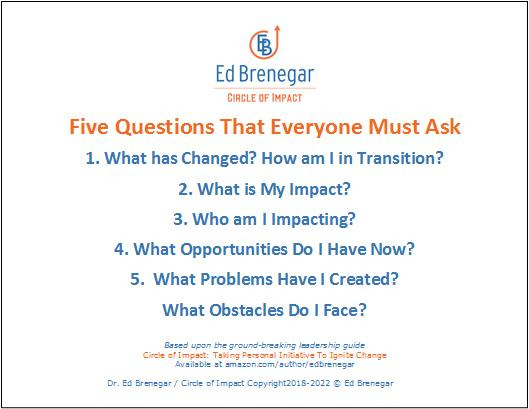
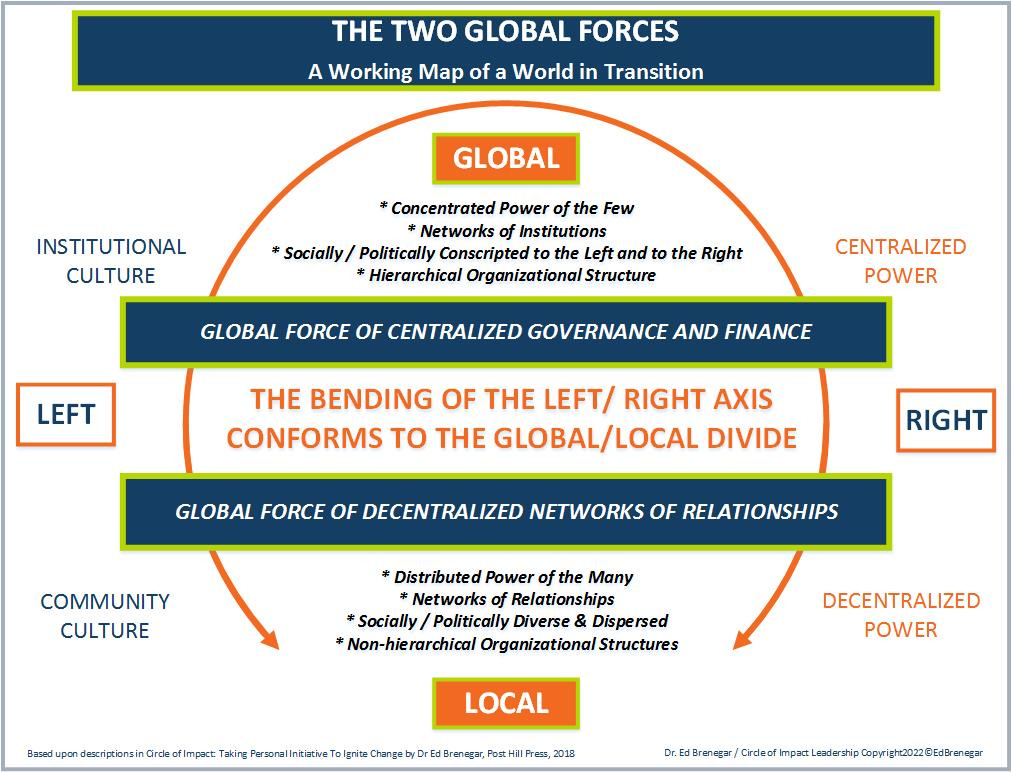
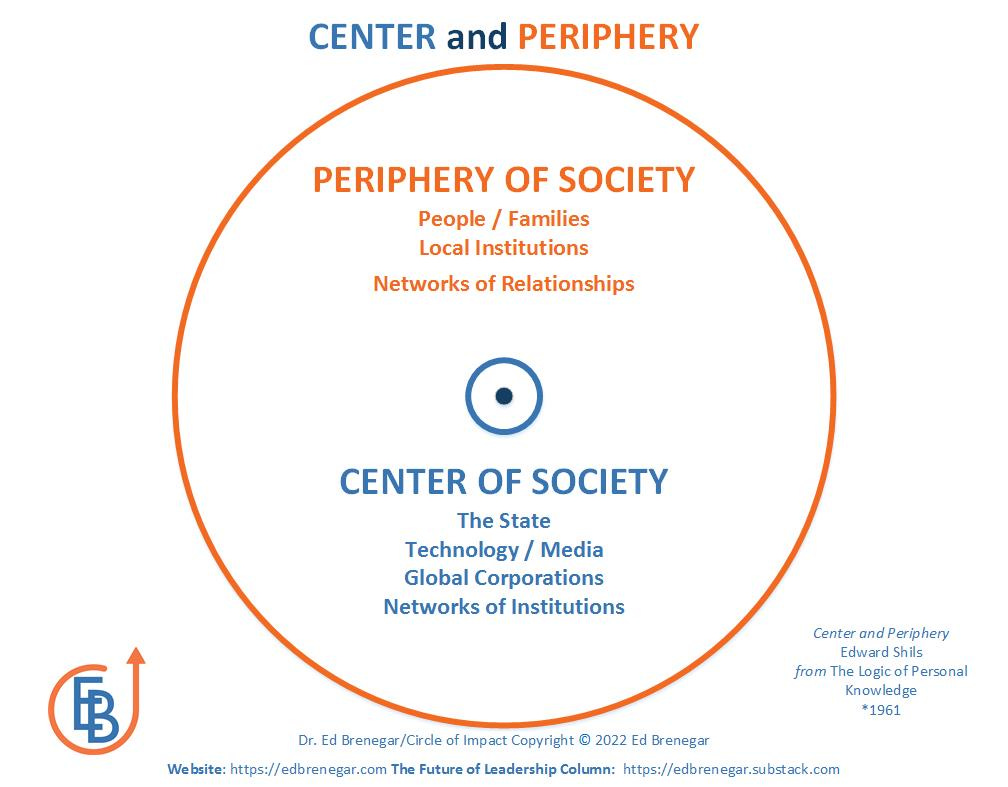
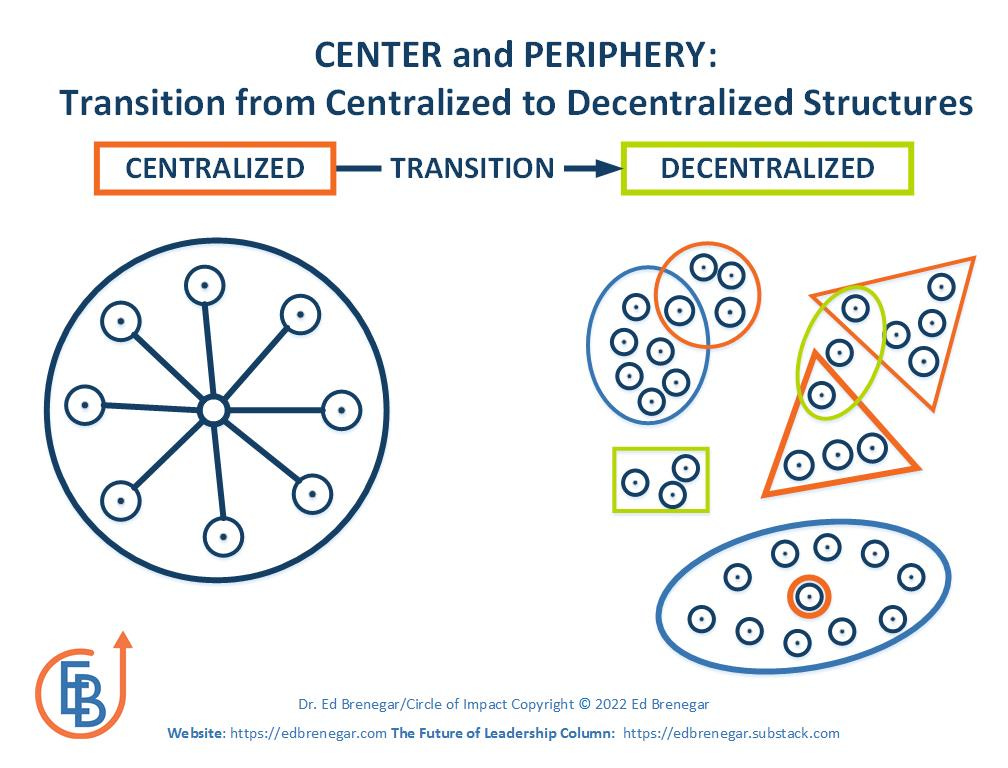
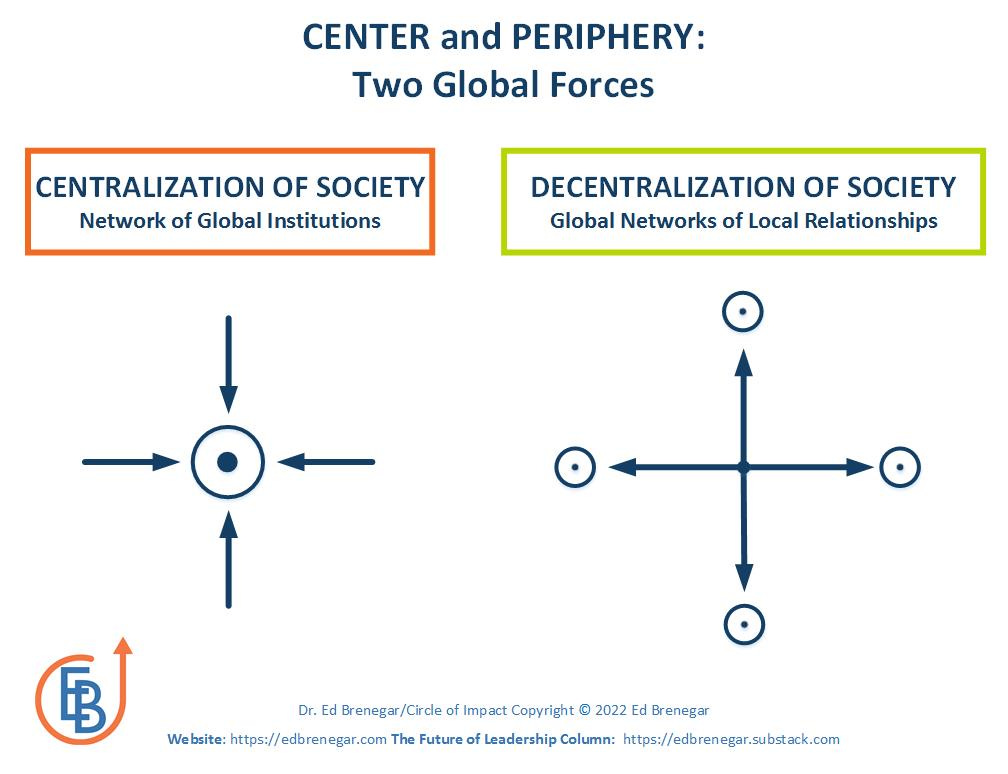
Superb. I definitely think you are identifying the problems and asking the right questions here (and thans for the link).